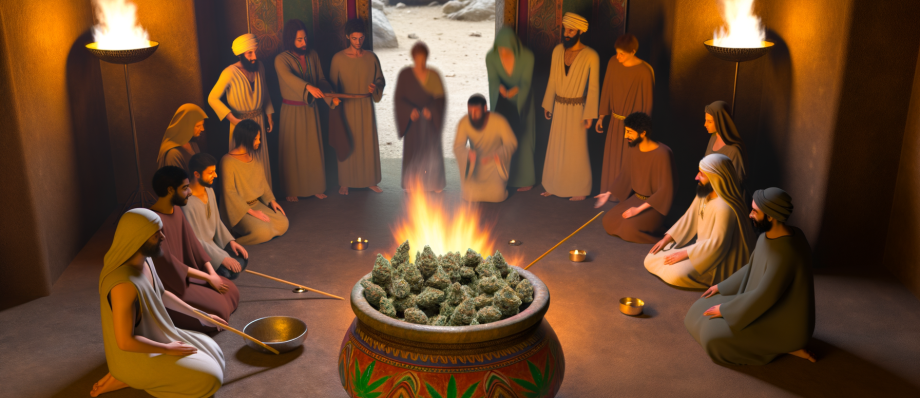Does The Bible Talk About Cannabis?
Introduction
The Bible is a religious text that holds significant importance for millions of people around the world. It addresses various aspects of life, morality, and spirituality. One topic that has sparked curiosity and debate is whether the Bible mentions cannabis, a plant known for its psychoactive properties. In this introduction, we will explore whether the Bible discusses cannabis and its implications within a religious context.
The Role of Cannabis in Biblical Times: A Historical Perspective
The Bible is a sacred text that has been studied and interpreted for centuries. It contains stories, teachings, and guidance that have shaped the beliefs and practices of millions of people around the world. One question that often arises is whether the Bible mentions cannabis, a plant that has been used for various purposes throughout history. To explore this topic, it is important to understand the role of cannabis in biblical times from a historical perspective.
Cannabis, also known as marijuana, has a long history of cultivation and use. It is believed to have originated in Central Asia and spread to different parts of the world, including the Middle East. In biblical times, cannabis was cultivated for its fibers, which were used to make ropes, clothing, and other textiles. The plant was also valued for its medicinal properties and was used to treat various ailments.
While the Bible does not explicitly mention cannabis by name, some scholars argue that it may be indirectly referenced in certain passages. One such passage is found in the book of Exodus, where Moses is instructed to make a holy anointing oil. The ingredients for this oil include myrrh, cinnamon, calamus, and cassia. The Hebrew word for calamus, “kaneh bosem,” has been interpreted by some as a reference to cannabis. However, this interpretation is not universally accepted, and there is ongoing debate among scholars.
Another passage that is often cited in relation to cannabis is found in the book of Genesis. In this passage, God gives Adam and Eve dominion over all the plants and animals on Earth. Some argue that this includes cannabis, as it is a plant that has been used by humans for various purposes. However, this interpretation is speculative and not supported by concrete evidence.
It is important to note that the Bible does contain teachings about the responsible use of substances. In the New Testament, the apostle Paul writes about the importance of self-control and avoiding drunkenness. While this specifically refers to alcohol, it can be applied to other substances as well, including cannabis. The Bible encourages believers to use their bodies as temples of the Holy Spirit and to make wise choices that honor God.
In conclusion, the role of cannabis in biblical times is a topic that is open to interpretation. While the Bible does not explicitly mention cannabis, some argue that it may be indirectly referenced in certain passages. However, these interpretations are not universally accepted, and there is ongoing debate among scholars. Regardless of whether cannabis is mentioned in the Bible, the teachings of the Bible emphasize the importance of responsible and wise choices when it comes to substances. Believers are encouraged to use their bodies as temples of the Holy Spirit and to make choices that honor God.
Examining the Interpretation of Biblical Passages on Cannabis
The Bible is a sacred text that has been studied and interpreted for centuries. It contains stories, teachings, and moral guidelines that have shaped the beliefs and practices of millions of people around the world. One topic that has gained attention in recent years is the use of cannabis, also known as marijuana, and whether the Bible addresses this issue.
When examining the interpretation of biblical passages on cannabis, it is important to consider the historical and cultural context in which these texts were written. The Bible was written over a span of many centuries, and the societies in which its authors lived had different customs and practices than our modern world. Therefore, it is crucial to approach these passages with an open mind and a willingness to understand the cultural nuances of the time.
One passage that is often cited in discussions about cannabis is found in the book of Genesis. In Genesis 1:29, God is said to have given humans “every seed-bearing plant on the face of the whole earth and every tree that has fruit with seed in it.” Some argue that this verse implies that God intended for humans to use cannabis and other plants for their benefit. However, others interpret this passage as a general statement about the provision of food and resources for humanity, rather than a specific endorsement of cannabis use.
Another passage that is sometimes referenced is found in the book of Exodus. In Exodus 30:23, God instructs Moses to make a holy anointing oil using specific ingredients, including “fragrant cane” or “sweet calamus,” depending on the translation. Some scholars believe that “fragrant cane” refers to cannabis, while others argue that it refers to a different plant altogether. The debate over the interpretation of this passage is ongoing, and there is no consensus among biblical scholars.
It is also worth noting that the Bible contains numerous passages that emphasize the importance of sobriety and self-control. For example, in the New Testament, the apostle Paul writes in 1 Corinthians 6:19-20, “Do you not know that your bodies are temples of the Holy Spirit, who is in you, whom you have received from God? You are not your own; you were bought at a price. Therefore, honor God with your bodies.” This verse, along with others that caution against drunkenness and excess, can be seen as a call to moderation and responsible behavior.
In conclusion, the interpretation of biblical passages on cannabis is a complex and nuanced topic. While some argue that certain verses imply a positive view of cannabis use, others interpret these passages differently. It is important to approach these discussions with an open mind and a willingness to engage in respectful dialogue. Ultimately, each individual must form their own beliefs and convictions based on their understanding of the Bible and their personal relationship with God.
Understanding the Modern Debate: Cannabis and Christian Ethics
The modern debate surrounding cannabis and Christian ethics has become increasingly relevant as more states and countries legalize the recreational and medicinal use of marijuana. Many Christians are grappling with the question of whether the Bible addresses the use of cannabis and what its stance might be. While the Bible does not explicitly mention cannabis, there are passages that touch on the broader topic of substance use and its implications for Christian living.
One of the key principles that Christians often turn to when discussing the use of cannabis is the concept of stewardship. Stewardship refers to the responsibility Christians have to care for and manage the resources that God has given them. This includes their bodies, minds, and the world around them. Proponents of cannabis argue that if used responsibly and in moderation, it can be seen as a part of God’s creation to be enjoyed and appreciated. However, opponents argue that the potential negative effects of cannabis on physical and mental health make it incompatible with the concept of stewardship.
Another important aspect of the debate is the biblical command to obey the laws of the land. Christians are called to submit to the governing authorities unless those laws directly contradict God’s commands. In places where cannabis is legal, Christians may argue that they have the freedom to use it responsibly within the boundaries set by the law. However, others may argue that even if it is legal, the potential harm caused by cannabis use should be enough to dissuade Christians from partaking in it.
The Bible also speaks to the issue of addiction and self-control. In several passages, Christians are encouraged to exercise self-control and avoid anything that may lead to addiction or enslavement. Critics of cannabis argue that it has the potential to be addictive and can impair judgment, leading to a lack of self-control. They believe that Christians should abstain from using cannabis to avoid the risk of addiction and the negative consequences that may follow.
On the other hand, proponents of cannabis argue that responsible use does not necessarily lead to addiction or lack of self-control. They believe that if used in moderation and with a clear mind, cannabis can be enjoyed without compromising one’s self-control or relationship with God. They also point to the fact that the Bible does not explicitly condemn the use of other substances, such as alcohol, which can also be addictive and impair judgment.
Ultimately, the debate surrounding cannabis and Christian ethics is complex and multifaceted. While the Bible does not directly address the use of cannabis, it provides principles and guidelines that Christians can use to inform their decision-making. Stewardship, obedience to the law, and self-control are all important factors to consider when grappling with this issue. Christians must prayerfully seek wisdom and discernment as they navigate the modern debate surrounding cannabis and its place in their lives.
![]()



